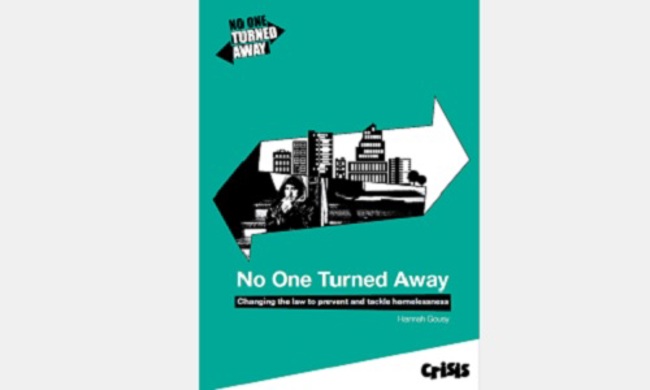No One Turned Away (2016)
05.04.2016
For the first time, the Housing (Homeless Persons) Act (1977) gave households in ‘priority need’ a right to statutory assistance and an offer of settled accommodation, but in doing so excluded most single homeless people. By restricting help to those who are not ‘intentionally’ homeless and have a ‘local connection’, the Act also continued to divide homeless people into the ‘deserving’ and ‘undeserving.’ As a result, single people are too often turned away to sleep on the streets when they ask their local authority for help.Even for those who do receive statutory assistance, the current legislation fails to mandate effective prevention work.
The Housing Act (1996) and the Homelessness Act (2002) refined and expanded the definition of priority need. Most recently a Supreme Court judgment redefined
the test for vulnerability, one of the factors that determines whether someone might qualify for statutory assistance. These changes have however been piecemeal and there has been no substantial reconsideration of the principles of the legislation for the last forty years.
At Crisis, we see the consequences of councils failing to intervene, trapping people in homelessness for far longer and ruining lives. In addition to the significant personal harm for individuals, there are also substantial financial costs incurred for both national and local government.
Both Scotland and Wales have introduced new legislation to address the historic lack of entitlements for single people, both demonstrating the viability and success of an approach that provides a broader set of entitlements for people facing homelessness
In response to the urgent situation in England Crisis convened an independent panel of experts from across the homelessness sector, including lawyers, an academic, local authorities, housing association sector representatives and homelessness charities to assess the strengths and weaknesses of the current homelessness legislation.3 The panel set out to design a new legislative model to prevent and tackle single homelessness more effectively, while ensuring that the current entitlements for those who are assessed as in priority need and owed the main statutory homelessness duty were not undermined. The expert panel reached agreement on an ambitious and practical alternative system.
Reference
Gousy, H. (2016) No One Turned Away: Changing the law to prevent and tackle homelessness. London: Crisis.


